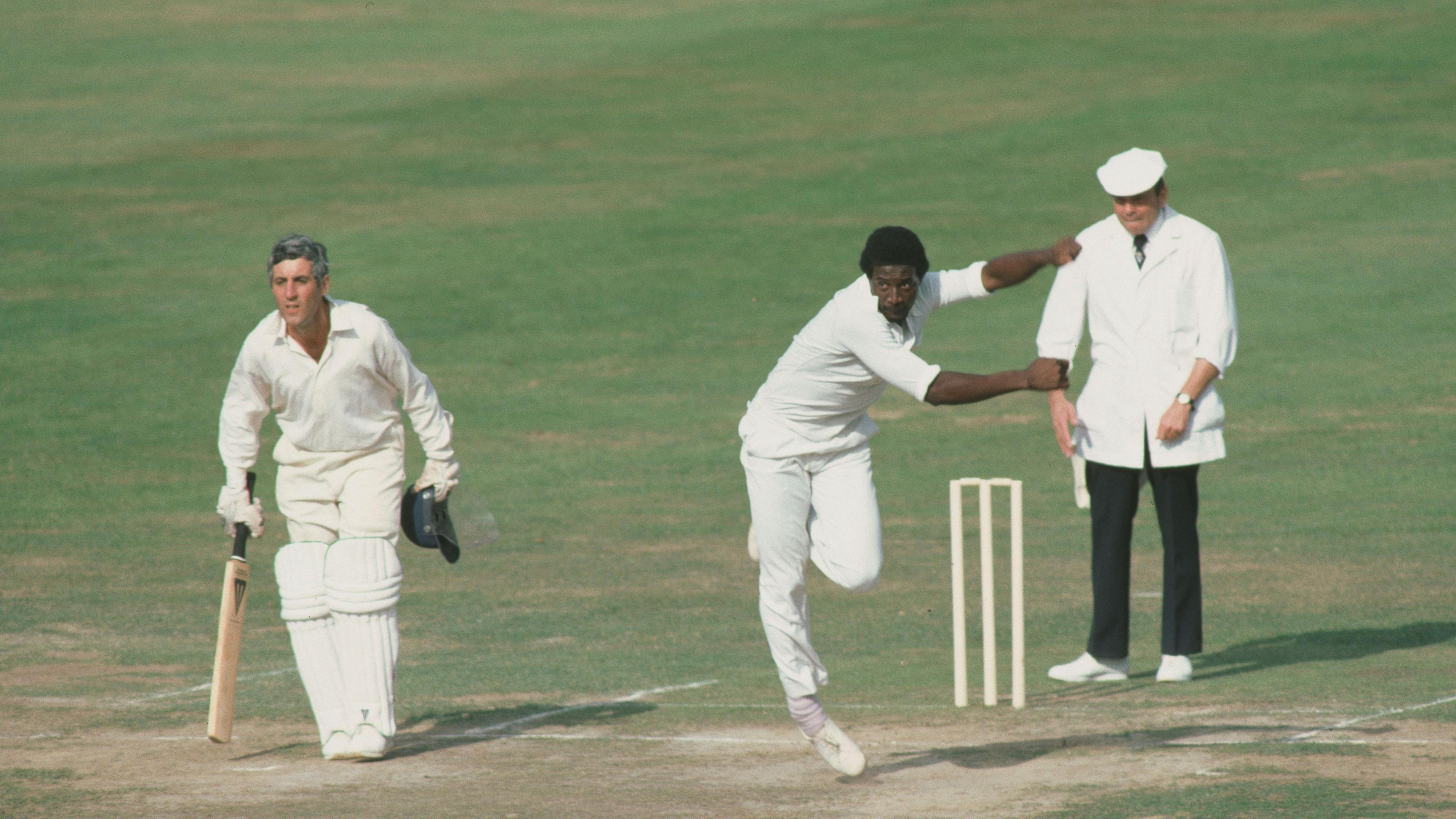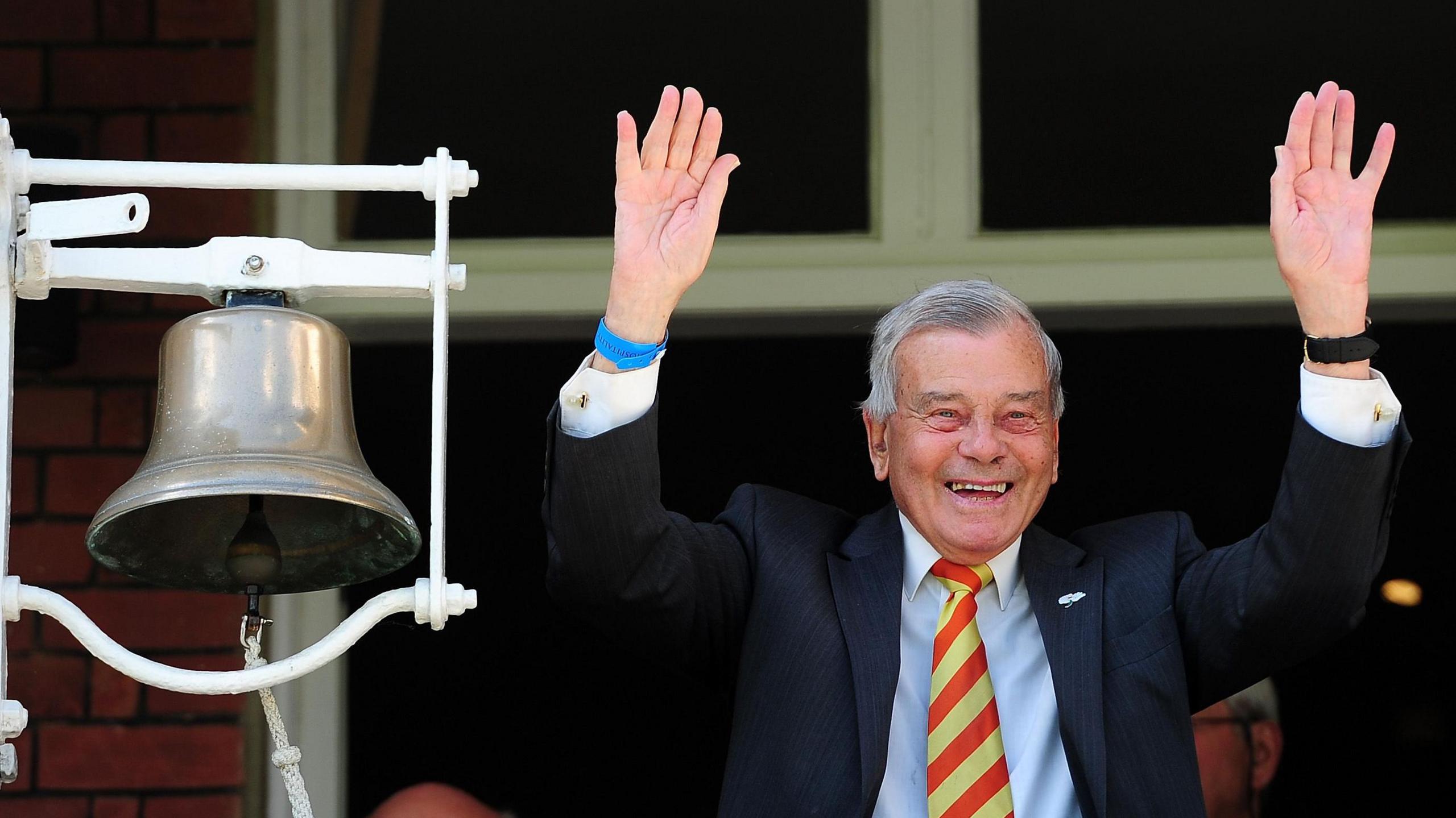Legendary umpire Bird dies aged 92

The sight of Bird in his white cap and coat became an iconic image in cricket
- Published
Dickie Bird, the iconic former cricket umpire, has died at the age of 92.
Bird, whose first-class playing career was cut short by injury, became one of the most famous faces in the game.
He officiated in 66 Tests and 76 one-day internationals, including three World Cup finals, between 1973 and 1996.
Bird's home county side Yorkshire, for whom he played and served as president, described him as a "national treasure, known not only for his umpiring excellence but also for his eccentricities and warmth".
"He leaves behind a legacy of sportsmanship, humility and joy - and a legion of admirers across generations," the club said.
The England and Wales Cricket Board said: "Everyone at the ECB is deeply saddened to hear of the passing of Dickie Bird.
"A proud Yorkshireman and a much-loved umpire, he will be sorely missed. Rest in peace, Dickie."
'Bird became cricket legend without scoring a run for England'
- Published23 September
Dickie Bird: A Rare Species
- Attribution
Bird was born in Barnsley and grew up playing club cricket with two fellow future luminaries - legendary England batter Sir Geoffrey Boycott and journalist and TV host Sir Michael Parkinson, with whom he remained close friends.
Paying tribute, Boycott said Bird was "loved by so many and became a legend". Parkinson died in 2023.
Bird, whose real name was Harold, began his playing career at Yorkshire before moving to represent Leicestershire.
A right-handed batter, he scored two centuries and averaged 20.71 in 93 first-class matches.
But he will be remembered for his career as an umpire, and at one stage his 66 Tests stood as a record.
He oversaw a number of unusual moments too - a bomb scare at Lord's when he sat on the covers on the pitch as crowds came on to the field, a burst water pipe at Headingley, and taking the players from the field at Old Trafford because the sun was reflecting off a window into the eyes of the batter.
Before his final Test in 1996, Bird was given a guard of honour on the outfield at Lord's by the England and India players.
He also umpired charity matches for Queen Elizabeth II, whom he said he met 29 times, and was awarded the Freedom of Barnsley in 2000.
There is a life-size statue of Bird in Barnsley town centre.
He stood in his last official match in 1998 - a game between Yorkshire and Warwickshire at Headingley, where he remained a regular visitor.
"The thoughts of everyone at the Yorkshire County Cricket Club are with Dickie's family and friends during this time," Yorkshire said.
"He will be truly missed by all at the club, having spent an incredible amount of time in support of everyone here, and will be remembered as one the greatest characters in Yorkshire's history."
Yorkshire said Bird died "peacefully at home".
'All the players loved him - cricket was his life'
He was one of those umpires to whom mishaps would occur. Bad light would always seem to come when Dickie was umpiring.
At Headingley the ground flooded one time because of a problem with the drainage system. Dickie was umpiring.
He didn't give a lot out, especially lbws. He was always quite safe and secure.
All the players loved him. He was brilliant at defusing situations on the field.
Fast bowlers like Dennis Lillee, Jeff Thomson - these big, aggressive characters - there could be some argy bargy on the field at times and yet they completely respected Dickie Bird.
If he stepped in and said, 'C'mon lads, let's get on with the game', they stopped and got on with the game. He was massively respected. He was loved.
He never married. Cricket was his life - his whole life. He just loved cricket.
He was eccentric. If you are so devoted to anything there is probably some element of eccentricity about you and, in Dickie's case, it was cricket.
He was a good player. He was always very nervous as a player - he'd be shaking, trembling and terribly anxious.
He didn't have many shots as a batsman and got moved on from Yorkshire and came to Leicestershire.
He just belonged out there with his white coat and white cap.

Bird was given honorary life membership of MCC in 1996
'He did it with a sense of humour'
Among those to pay tribute to Bird was former Prime Minister David Cameron who said: "He was a national treasure and I was fortunate to have shared some hugely enjoyable times with him over the years.
"At 92 he had a good innings. Farewell friend."
Bird's sister Marjorie Wyatt said: "Dickie was always proud of putting Barnsley on the map – he was Barnsley through and through.
"He was very caring and used to bring us home souvenirs.
"I would wash his cricket whites and his famous white flat cap, and he always appreciated that they would be immaculate and he would be turned out the best.
"What I will remember most about him was that he was always good at making decisions!"
Former England captain David Gower said Bird will be "remembered as one of the best umpires ever to take the field".
"He certainly set himself high standards as an umpire, but that smile on his face at all times - whether he's giving you out or not out, whatever he was doing out in the middle - you just knew that Dickie was in the place that he loved best," Gower told the BBC.
"He was just a very, very good umpire. He had a sense of humour. He had the ability in his own very quirky and slightly barmy way of being able to get on with everyone.
"Everyone respected him immensely for what he was on the field, and he was the most likeable man off it.
"Umpiring gave him the opportunity to stay in the game that he'd loved from childhood."
Boycott said: "When I was 15 and taken to Barnsley Cricket Club by my Uncle Algy, I was in awe of him because every week Dickie was the star batsman and he made a half-century to get a collection.
"He was a very good technical batsman but nerves got the better of him when he stepped up to play for Yorkshire and he could never quite hold down a place in the first team.
"When he became a first-class umpire he was absolutely brilliant. He made light of his nerves - even channelled them into making a success of umpiring.
"Players all over the world respected and admired him for his firmness, fairness, and he did it with a sense of humour."
Former England captain Kevin Pietersen described Bird as an "absolute legend of English cricket".
"May you rest in peace knowing that you were loved by all," Pietersen said. "I had so many amazing moments with Dickie. A remarkable character that will be missed dearly!"
Related topics
- Published16 August
